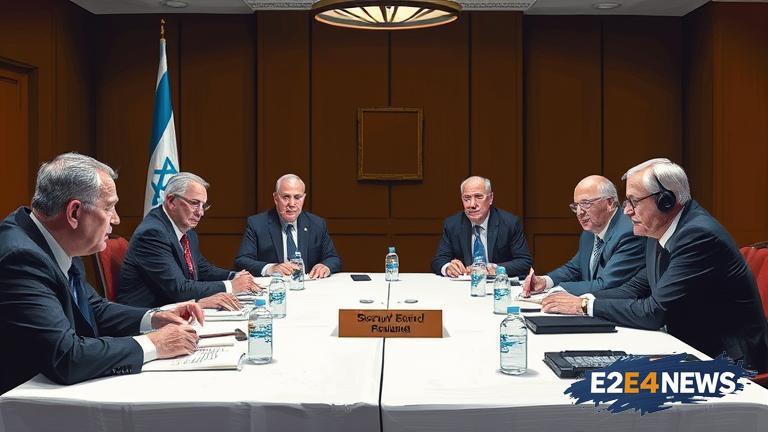Israel’s Security Cabinet is scheduled to convene on Tuesday to discuss the ongoing situation in Gaza, including a potential ceasefire and a hostage deal. The meeting comes amid heightened tensions in the region, with both Israeli and Palestinian officials expressing concerns about the escalating violence. The Security Cabinet, which is responsible for making key decisions on Israel’s national security, will be chaired by Prime Minister Benjamin Netanyahu. The cabinet is expected to discuss a range of issues, including the recent exchange of fire between Israel and Palestinian militants in Gaza. The situation in Gaza has been deteriorating in recent weeks, with both sides accusing each other of violating a fragile ceasefire. The Israeli military has been carrying out airstrikes in Gaza, targeting what it says are militant sites, while Palestinian militants have been firing rockets into Israel. The violence has resulted in the deaths of several people on both sides, including civilians and militants. The international community has been calling for a ceasefire and a return to negotiations, but so far, a lasting agreement has not been reached. The Security Cabinet’s meeting on Tuesday is seen as a crucial step in addressing the situation in Gaza and finding a way to reduce tensions. The cabinet is expected to discuss a range of options, including a potential ceasefire and a hostage deal. The hostage deal refers to the release of Israeli civilians being held by Hamas in Gaza, in exchange for the release of Palestinian prisoners being held by Israel. The deal has been in the works for several months, but has been delayed due to disagreements over the terms. The Security Cabinet’s discussion on Tuesday will be closely watched by the international community, which is eager to see a resolution to the conflict. The United States, the European Union, and other countries have been calling for a ceasefire and a return to negotiations, and have offered to help facilitate a deal. The situation in Gaza is complex and multifaceted, with a range of factors contributing to the tensions. The blockade of Gaza, which has been in place since 2007, has had a devastating impact on the economy and living conditions in the territory. The lack of access to basic necessities like food, water, and healthcare has led to widespread poverty and desperation. The conflict has also been fueled by ideological and political differences between Israel and the Palestinians, with both sides having competing claims to the land. Despite the challenges, there are still hopes for a peaceful resolution to the conflict. The Security Cabinet’s meeting on Tuesday is seen as a crucial step in addressing the situation in Gaza and finding a way to reduce tensions. The international community is eager to see a ceasefire and a return to negotiations, and is willing to offer support and assistance to help facilitate a deal. The people of Gaza and Israel deserve to live in peace and security, and it is the responsibility of leaders on both sides to work towards a resolution. The Security Cabinet’s discussion on Tuesday will be closely watched, and the outcome will have significant implications for the region. A ceasefire and a hostage deal would be a major step forward, and would help to reduce tensions and improve the living conditions in Gaza. However, the road to peace is long and challenging, and will require significant efforts and compromises from both sides. The international community must continue to play a supportive role, and offer assistance and guidance to help facilitate a deal. The situation in Gaza is a reminder of the importance of diplomacy and dialogue in resolving conflicts, and the need for leaders to work together to find peaceful solutions. The Security Cabinet’s meeting on Tuesday is a crucial step in this process, and the outcome will have significant implications for the region and the world.
